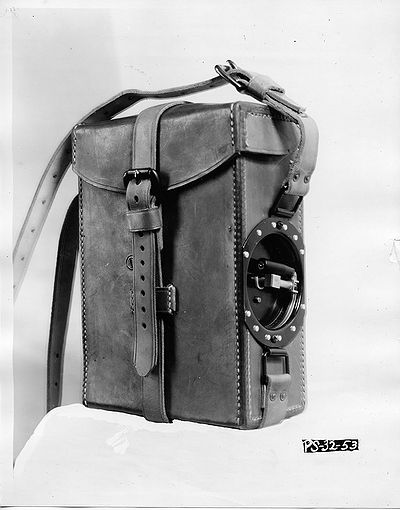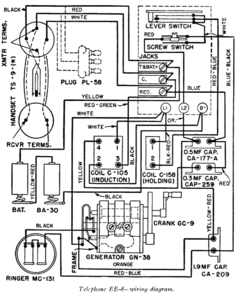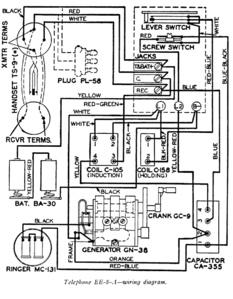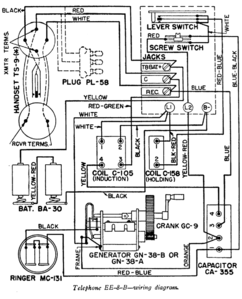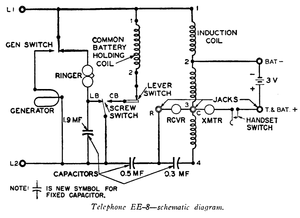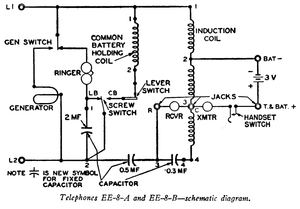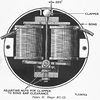Difference between revisions of "EE-8"
Jump to navigation
Jump to search
RadioNerds (talk | contribs) |
RadioNerds (talk | contribs) |
||
| Line 60: | Line 60: | ||
| − | + | ;{{cecom_pdf|SIG_7_8_EE-8.pdf|SIG 7 & 8 EE-8}} | |
| + | :Organizational Maintenance Allowances and Field and Depot Maintenance Stockage Guide | ||
| + | :Telephone | ||
| + | ::EE-8; EE-8-A, B, C, D, E | ||
| + | ::29 October 1956 | ||
| + | |||
* [[File:SIG 10-809.pdf]] | * [[File:SIG 10-809.pdf]] | ||
Revision as of 21:25, 12 May 2015
The EE-8 Field Telephone was used by the Signal Corps from before World War II through the Vietnam War. It was housed in leather, then canvas, and its last production had a nylon case and straps, after the changeover to that material in 1967.
The EE-8 Field Telephone was standardized in 1932 and procurement began in 1937, providing a lighter and more functional unit just in time for the huge mobilization of the U.S. military for WW II. Among other improvements, the EE-8 increased the maximum transmission range of the predecessor EE-5 Field Telephone by six miles or more. utilizes ME-22 maintenance equipment.
Contents
Schematics
Images
Related Files
- War Department Technical Manual
- Telephones
- EE-8,
- EE-8-A
- EE-8-B
- March 1945
 EE-8A Manual in Russian[1]
EE-8A Manual in Russian[1]- Manual in Russian
- EE-8A
- 1943
 SIG 8-EE-8[2]
SIG 8-EE-8[2]- Army Service Forces Catalog
- Signal Supply Catalog
- Higher Echelon Spare Parts for
- Telephone
- EE-8
- 10 February 1945
 SIG 7 & 8 EE-8[3]
SIG 7 & 8 EE-8[3]- Organizational Maintenance Allowances and Field and Depot Maintenance Stockage Guide
- Telephone
- EE-8; EE-8-A, B, C, D, E
- 29 October 1956
References
- ↑ EE-8A Manual in Russian,
- "US Army Technical Manual Collection,"
- from the CECOM Historical Office archive, Aberdeen Proving Ground, MD.
- CECOM Historical Office
- "US Army Technical Manual Collection,"
- ↑ SIG 8-EE-8,
- "US Army Technical Manual Collection,"
- from the CECOM Historical Office archive, Aberdeen Proving Ground, MD.
- CECOM Historical Office
- "US Army Technical Manual Collection,"
- ↑ SIG 7 & 8 EE-8,
- "US Army Technical Manual Collection,"
- from the CECOM Historical Office archive, Aberdeen Proving Ground, MD.
- CECOM Historical Office
- "US Army Technical Manual Collection,"
